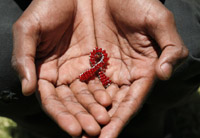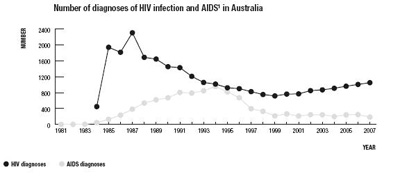HIV/AIDSWhat is HIV?HIV stands for Human Immunodeficiency Virus. It is a virus which destroys the body's natural ability to fight infections and some cancers. What is AIDS?AIDS stands for Acquired Immune Deficiency Sydrome. It is a group of illnesses which occurs as a result of a weakened immune system in people who are infected with HIV. Without treatment of HIV, AIDS can occur several years after a person becomes infected with HIV What happens when a person is infected with HIV?
When infected with HIV, the virus enters the body and lives and multiplies primarily in the white blood cells. These white blood cells are immune cells, which normally protect us from disease. When infected with HIV, there is a progressive loss of a specific type of immune cell, called the T-helper. As the virus grows it damages and kills these T-helper cells and other cells, which weakens the immune system and make the person more vulnerable to various opportunistic infections and other illnesses, ranging from pneumonia to cancer. A person can be clinically diagnosed with AIDS, if he or she has tested positive with HIC and meets one or both these conditions:
Prevalence of HIV/AIDS?The annual number of new HIV diagnoses in Australia has steadily increased over the past 8 years, from 718 cases in 1999 to 1,051 in 2007. The annual number of AIDS diagnoses in Australia has remained relatively stable in 2001-2007 at around 240, this is a result of the wide availability of effective antiretroviral therapies.
2008 Annual Surveillance Report: HIV/AIDS, Viral Hepatitis and Sexually Transmissible Infections in Australia How is HIV transmitted?An infected person can pass the virus on to someone else by the exchange of body fluids, such as semen, vaginal fluids, blood and breast milk. The virus can be transmitted only if HIV-infected fluids enter the bloodstream of another person. This type of entry can occur through the linings of the vagina, rectum, mouth and opening at the tip of the penis, through intravenous injection with a syringe and through a break in the skin, such as a cut or sore. Usually HIV is transmitted through:
HIV CANNOT be transmitted through:
Sex therapy and Relationship Counselling is available in Sydney, New South Wales (NSW) - Melbourne, Victoria (VIC) - Adalaide, South Australia (SA) - Perth, Western Australia (WA) - Darwin, Northern Territories (NT) - Hobart, Tasmania (TAS) - Brisbane, Queensland (QLD) - Canberra, Australian Capital territory (ACT) |
|
|


 About half the people who become infected with HIV will develop a flu-like illness, similar to glandular fever, with swollen glands in the neck, armpits and groin, and headaches, fever and a rash. These symptoms are usually present within 6 weeks of infection but can often be overlooked.
About half the people who become infected with HIV will develop a flu-like illness, similar to glandular fever, with swollen glands in the neck, armpits and groin, and headaches, fever and a rash. These symptoms are usually present within 6 weeks of infection but can often be overlooked.

